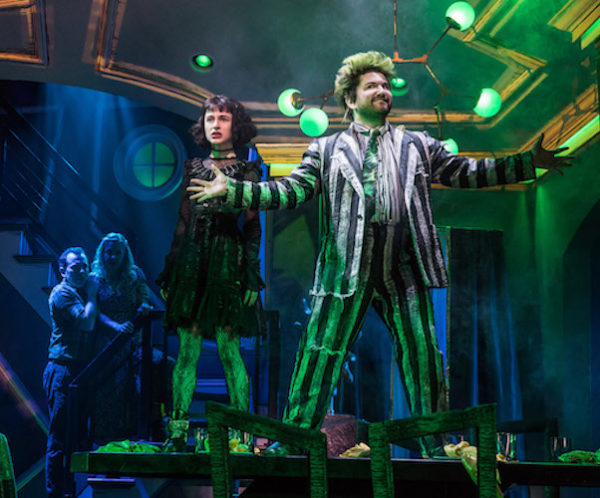Theater Review: “Beetlejuice” Bombards Broadway
By Christopher Caggiano
Beetlejuice may not be the blockbuster its creators are hoping for, but it is occasionally humorous and rarely dull.
Beetlejuice at New York’s Winter Garden Theater.

Rob McClure, Kerry Butler, Sophia Anne Caruso, and Alex Brightman in “Beetlejuice.” Photo: Matthew Murphy
An unremitting barrage of nostalgia continues to strafe Broadway. Ever since Mamma Mia! and The Producers hit major theatrical pay dirt in 2001, music publishers and movie studios have been combing through their catalogues in search of musical theater gold. But, for every blockbuster like Jersey Boys or an intimate gem like Once, there are execrable misfires such as The Cher Show or the sloppily crafted Mean Girls.
The latest entry in the movies-to-musicals sweepstakes is Beetlejuice, based on the 1988 Tim Burton film starring Michael Keaton, Alec Baldwin, and Winona Ryder. I’ve only ever been able to tolerate the movie in short bursts, partly because none of the characters feels especially real or likable. And I’ve always been irritated by Michael Keaton’s mumbling, look-at-me-aren’t-I-funny performance.
For the uninitiated, the story to Beetlejuice involves Adam and Barbara Maitland, a young couple who meet an untimely end but remain — as ghosts — in their beloved home. A new family moves in, and the Maitlands do their best to haunt the newcomers away. They run into trouble in the scaring department and turn to a more experienced specter, the frenetic Beetlejuice, who proceeds to cause all kinds of trouble. And not always the kind that the Maitlands were hoping for.
In some ways, the stage musical represents an improvement over the film. Some minor characters have been combined or eliminated, and events have been compressed, so the narrative is more efficient. Librettists Scott Brown and Anthony King have also added a plot element: Lydia, the morose daughter of the house’s new residents, wants to bring her deceased mother back from the netherworld, which adds some pathos to an otherwise manic story.
Although Beetlejuice the musical may improve some on the movie, it’s not high quality musical theater. There’s way too much business — via Alex Timbers’s by-the-numbers direction and Connor Gallagher’s pedestrian choreography — and not enough heart. Eddie Perfect’s songs are a considerable improvement over those he wrote for the abysmal King Kong, but that’s not a very high bar. There’s plenty of wit in Perfect’s wordplay, although his lyrics contain too many examples of slant rhyme (e.g. pairing “Christmas” with “statistics” and “Triscuits”) for my admittedly traditional taste in lyrics.
Perfect’s generic melodies are less successful, although there are some lively set pieces for the irrepressible Alex Brightman in the title role. And the songs feel pasted in, stopping the action versus moving it along. Every tune seems to end with a really long vocal note and a musical button, which grows tiresome.
A game cast of Broadway stalwarts struggles to make an impression amid the antic busyness. For some, Brightman’s energetic turn may be enough reason to see the show. As the vapor thin Maitlands, the otherwise talented Rob McLure (who seems to be making a career as the forever put-upon schlemiel) and Kerry Butler (likewise, but as the quirky-but-charming ditz) fade away.
Leslie Kritzer, a reliable scene stealer, manages considerably better in a role that combines Delia, the Catherine O’Hara role from the movie, and the late Miss Argentina (from the movie’s office of afterlife assistance). The creators try to fill a — you should pardon the pun — dead spot in the middle of the second act with a lively but unnecessary number for Kritzer as Miss Argentina. The young Sophia Anne Caruso, a revelation in the otherwise unbearable David Bowie musical Lazarus, is merely serviceable here, more or less disappearing behind Lydia’s goth trappings.
Beetlejuice may not be the blockbuster its creators are hoping for, but it is occasionally humorous and rarely dull. I see it as a welcome bit of diversion in a Broadway season that has already inflicted upon us mind-numbing spectacle (King Kong), ear-piercing irritation (Be More Chill), and bloated, inept nostalgia (The Cher Show, Ain’t Too Proud).
Christopher Caggiano is a writer and teacher based in Boston. He serves as Associate Professor of Theater at the Boston Conservatory at Berklee. His writing has appeared in American Theatre and Dramatics magazines, and on TheaterMania.com and ZEALnyc.com.
